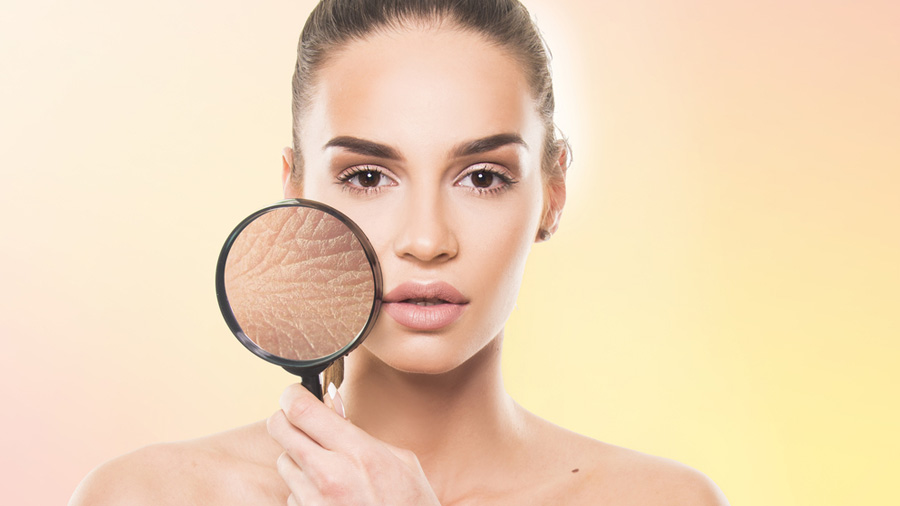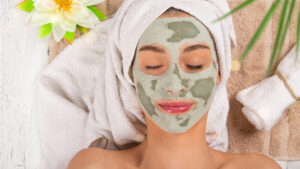
Author: Johanna Heuer
"What is my skin type?" This is the question most women ask themselves, especially when searching for the suitable skin care products. But how can I care for my skin properly if I don't know what it needs?
Your skin type is the most important factor you should consider when looking for skincare products and Skin care routine must take into account. For this reason, we explain in this article what skin types there are, what to consider when caring for each type and finally, how you can determine your own skin type yourself.
"Suitable for all skin types"
You've probably read the words "suitable for all skin types" hundreds of times while shopping in the drugstore. So first, let's look at what skin types there are and what differentiates them from each other.
In total, there are 7 general skin types: oily, dry / dehydrated, normal, combination, acne-prone, sensitive and mature. Of course, there are also gradations among these categories, because every skin is unique. However, the general characteristics can be divided into these 7 types.
Every skin and therefore every skin type comes with its own characteristics and challenges, on which the right care methods and products should be based. Knowing and truly understanding your skin type is the first step to taking care of your skin. With the help of your skin type, you will have the opportunity to develop a skin care routine that is tailored to your skin and which right products to find your problem areas, analyse them and finally also Make changes to your lifestyle.
So let's take a look at the different skin types.
The 7 skin types
Oily skin
Oily skin produces an excess of sebum. This makes the skin appear shiny and "greasy", especially in the T-zone (forehead, nose and chin). In this case, the pores on the face are likely to be larger, impurities develop more quickly and the skin is more prone to acne overall.
Dry skin
This skin type often appears dull and rough or can even become flaky. Dry skin feels tight or less elastic and generally tends to develop visible wrinkles more quickly. In many cases, the skin may be very itchy or irritated.
Normal skin
The name says it all - normal skin is balanced because it feels neither dry nor oily. Many of the complaints that other skin types experience (flaking, feeling of tightness, acne breakouts, etc.) do not occur with normal skin. The pores are usually small and the skin texture is smooth.
Combination skin
Combination skin describes a combination of oily and dry skin. This means that different skin types are found in different areas of the face. As a rule, the T-zone is more oily, while the cheek areas are either dry or normal.
Sensitive skin
This skin type differs from the others in that it describes more of a characteristic that can occur with oily, dry or normal skin. Sensitive skin is often red and feels burning, itchy or dry. This is often caused by external influences, such as certain ingredients or environmental factors.
Mature skin
Over the years, our skin changes. So it is no surprise that its appearance and structure change with age. The effects of external influences such as UV radiation, but also the normal internal processes such as reduced cellular activity, cause the skin to develop new characteristics. Mature skin often lacks moisture and elasticity and develops lines, wrinkles and pigmentation.
Impure skin
Blemished skin is particularly prone to blackheads, pimples and acne. In many cases, impure skin is also sensitive and produces more sebum than necessary, which leads to the difficulties mentioned above. In many cases, blemished skin is the result of genetic predispositions, especially in relation to hormonal fluctuations.
How to determine your skin type
While reading this, you probably already know some of the characteristics of the different skin types, as you can find them on yourself. But how exactly do you determine your skin type at home?
You can consult your dermatologist, but with the right questions and methods, you can find the answer yourself.
Note: In case of strong Skin problems it is always advisable to consult a dermatologist.
One method you can use to determine your skin type is the following:
Wash your face with a gentle cleanser and pat dry. It is important not to apply any creams or products afterwards, but to let the skin rest. After 30 minutes, you can check your skin in the mirror for basic characteristics. If you cannot draw a conclusion from the mere appearance of your skin, there are some questions to help you.
- What do your pores look like? How big are your pores and where are they located?
- Is your skin red?
- Is your skin shiny? If so, is it only shiny in certain areas?
- How does your skin feel?
- What does your skin usually need in the afternoon (powder, cream etc.)?
- How does your skin feel after washing your face (tight, dry, itchy etc.)?
- How often do you struggle with pimples and blackheads?
Then match your answers to these questions with the characteristics of the respective skin types and you will certainly quickly be able to identify with one of the types described.
The right skin care for all skin types
And what is the best way to care for your correctly identified skin type?
The most important thing to remember is that you are not only taking care of your skin from the outside, but a lot of it comes from the inside. Try it with Antioxidants.
So if you listen to your body and therefore your skin, take care of it and support it, you can achieve a lot. Make sure you eat a balanced diet and also take care of your overall health. Our tigogreen - Products can help you with this.
But of course, proper skin care should not be underestimated.

At Oily skin avoid ingredients like mineral oils, petrolatum and alcohol, especially to control shine. Products that do not clog pores, such as oil-free moisturisers, chemical peels, Green tea extract and clay masks are particularly helpful. It is best to use care products that are labelled "non-comedogenic".
At Dry skin the opposite is true: use a rich moisturiser several times a day. Avoid strong soaps and products with lots of fragrances or citrus oils, as these will only dry out the skin further. The same goes for alcohol. Water-based products and Natural products with green tea are ideal for dry skin.
When it comes to the care of Normal skin It's much less complicated for normal skin than for other skin types. Normal skin tolerates most ingredients, so you can experiment with a lot of products to find what works best for you.
Since the Combination skin is a combination of dry and oily skin, you should avoid the same ingredients as for oily and dry skin, e.g. alcohol-based products. It is best to treat problem areas with spot treatments and use products that balance the skin, for example by Probiotics.
When your skin sensitive the most important thing is to find out what triggers the sensitivity. Once you have identified the specific ingredients, you can use this knowledge to avoid the products in question. For redness, irritation and itchiness, products with probiotic bacteria such as Bacillus Subtilis should be used, as these restore the balance of the skin flora. In case of severe skin reactions, an allergy test by a doctor is even recommended.
At mature skin care usually consists of taking preventive action to keep signs of ageing from appearing earlier. Accordingly, care consists of anti-ageing products such as day and night creams as well as retinol and green tea.
Impure skin is primarily treated with antibacterial cleansing and care products that restore the skin's balance. There are also a large number of products specifically designed for acne to minimise breakouts. Substances that particularly help here are: Salicylic acid, clay, benzoyl peroxide or retinol. In addition, products with green tea can help cleanse the pores and prevent blemishes.
However, for all skin types, UV protection should always be part of the skincare routine. The use of sun creams and products with ingredients that act as natural UV protection, such as green tea extract, is therefore the order of the day.
Feel free to check out our Shop to get your hands on some supportive skincare products!
Sources:
https://www.sciencedirect.com/science/article/abs/pii/S0733863508000259



